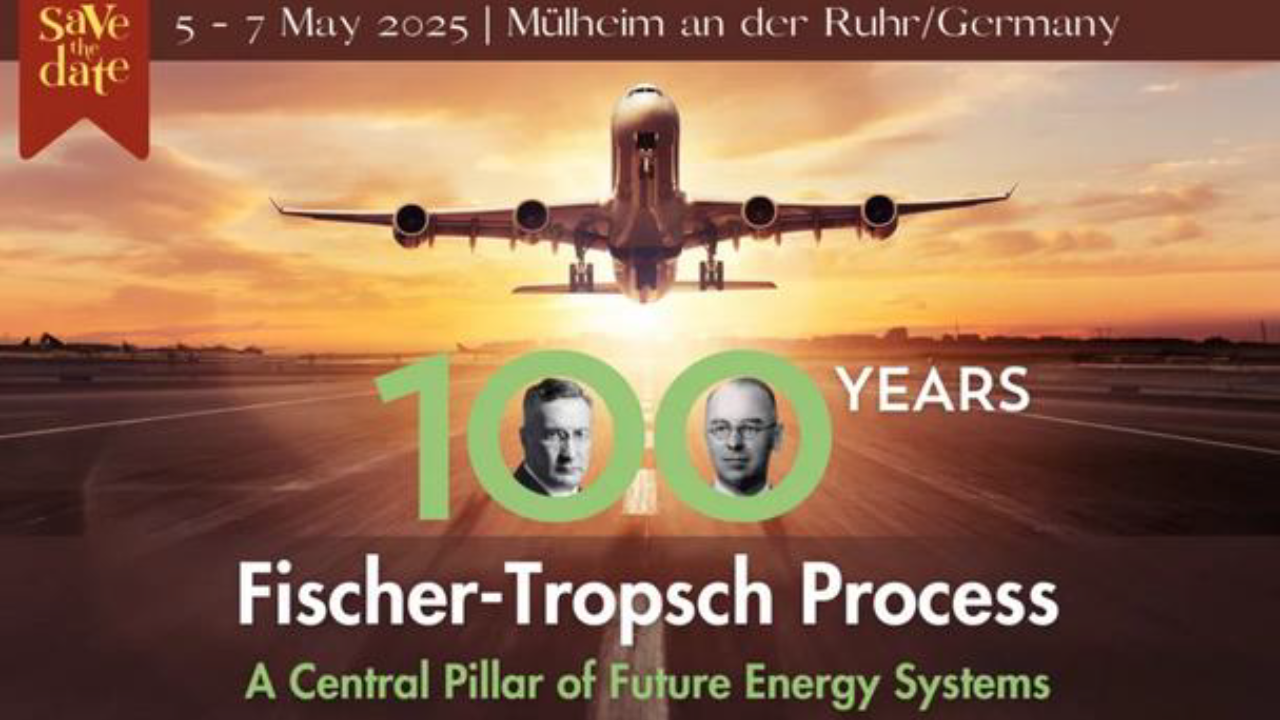100 Years of Fischer-Tropsch Process: A Central Pillar of Future Energy Systems
International conference in Mülheim an der Ruhr sheds light on the relevance of the chemical process for the energy transition
From 5 to 7 May 2025, Mülheim an der Ruhr will become a meeting place for international researchers from science and industry: A top-class scientific conference will honour the Fischer-Tropsch synthesis - a chemical process for the production of liquid fuels that was discovered 100 years ago at the Kaiser-Wilhelm-Institut für Kohlenforschung (now the Max- Planck-Institut) in Mülheim and is more relevant than ever today.
The Fischer-Tropsch synthesis discovered by Franz Fischer and his colleague Hans Tropsch at the former Kaiser-Wilhelm-Institut für Kohlenforschung is probably one of the most versatile chemical reactions with outstanding significance for science and industry. When it was patented 100 years ago, the reaction was used to convert coal or natural gas into liquid fuels. Today, the process is part of green chemistry and plays an important role in a sustainable energy supply for mobility and for the production of chemical raw materials.
Walter Leitner, Director at the Max Planck Institute for Chemical Energy Conversion: ”In view of the global challenges of decarbonisation and defossilisation, the Fischer-Tropsch synthesis is more relevant than ever. Its extraordinary versatility makes it a key process for any energy conversion. Today, we can also produce synthesis gas from biomass or from CO₂ and water using renewable energy. This results in innovative ‘Power-to-X’ solutions for sectors that are difficult to electrify, such as aviation, shipping and the chemical industry.”
The two Max Planck Institutes in Mülheim have teamed up with DECHEMA and the SynGas Convention Conference Cape Town to organise a three-day congress to highlight the current technological and industrial significance of the Fischer-Tropsch synthesis at its birthplace. ‘100 Years of Fischer-Tropsch Process. A Central Pillar of Future Energy Systems' promises a look at the history of the catalytic reaction and, above all, the latest scientific findings from research MPI für Kohlenforschung and industrial applications. Around 200 experts from all over the world are expected in Mülheim to exchange views on this key technology in lectures, poster sessions and discussions. Representatives from industry, politics, research and society will discuss the social and environmental potential of synthesis in a high-profile panel discussion at the start of the event.
Ferdi Schüth, director of the Max-Planck-Institut für Kohlenforschung and honorary member of DECHEMA, is convinced: "The Fischer-Tropsch process is a prototype for a discovery from basic research with high application relevance; it will become increasingly important in the course of the energy turnaround.” The carbon monoxide required for the Fischer-Tropsch reaction can come from almost any source. Researchers are currently looking at ways to extract it from industrial waste gases or directly from carbon dioxide in the air. If hydrogen produced by electrolysis with renewable energy is then used in the process, a climate-friendly method of producing e-fuels for aircraft or ships is available”, says Schüth. Fischer-Tropsch synthesis would thus make an important contribution to the transformation of transport in a sector that cannot use electricity directly.
The Fischer-Tropsch process
More than 100 years ago at the Kaiser Wilhelm Institute for Coal Research in Mülheim, Germany, chemists Franz Fischer and Hans Tropsch discovered a process for producing synthetic hydrocarbons from coal. By reacting with water at high temperatures, they initially produced a gas mixture of carbon monoxide and hydrogen, which could then be converted into various liquid hydrocarbons using catalysts at normal pressure and moderate temperatures. This discovery was an important milestone for the institute, which opened in 1914 with the aim of conducting scientific research into coal and finding ways to liquefy it.
Although the industrial application of the Fischer-Tropsch synthesis, patented in 1925, was overshadowed in the following years by more economical processes such as the Bergius synthesis in Germany, its scientific value remained undisputed. The extraordinary versatility of the Fischer-Tropsch synthesis makes it once again the key process for any energy conversion that produces hydrocarbons from carbon sources such as biomass or even CO2.
learn more about the event
back to overview
© DECHEMA e.V. 1995-2026, Last update 07.04.2025

